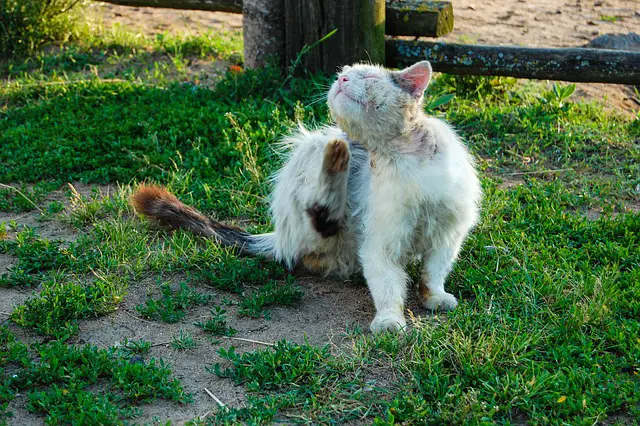While it may seem like a minor nuisance, fleas can be more than just an annoyance for your cat. Fleas can cause many physical problems, leading to serious health issues and even affecting their behavior.
As any cat owner knows, cats are sensitive animals, and their behavior can vary significantly daily. If you suspect your cat’s behavior has changed, it is essential to consider if fleas may be the cause. So let’s take a closer look at how fleas can affect your cat’s behavior.
Can fleas affect cat behavior?
Yes, fleas can have a significant effect on the behavior of cats.
Feline infestations with fleas can cause skin irritation and lead to scratching, which can be an issue due to the risk of infection or injury.
Fleas can also cause feline anemia, which is a condition that leads to tiredness and a lack of energy.
These conditions can affect not only your cat’s behavior but its physical health as well.
It is essential that any changes in behavior are investigated; therefore, any sign of flea infestation should warrant immediate veterinary attention so that an appropriate treatment plan can be implemented.
Flea Allergy Dermatitis (FAD)
Flea allergy dermatitis is the most common skin condition in cats and is caused by an allergy to flea saliva.
Symptoms of FAD include excessive scratching, licking, biting, hair loss, inflamed skin, and scabs on the body or tail.
These reactions are often painful and uncomfortable for cats, which can lead to behavioral changes such as aggression or avoidance.
Additionally, suppose your cat constantly tries to scratch or bite itself due to FAD. In that case, they will likely become irritable and agitated around people or other animals in their environment because they associate them with the pain associated with the allergies.
Anemia
Fleas are a widespread problem for cats, and if left untreated for prolonged periods, they can result in severe anemia.
Anemia caused by flea infestation is an often neglected issue as it can directly influence your cat’s behavior. Signs of anemia include lethargy, poor appetite, reduced activity, pale gums, and groggy behavior.
These signs may be attributed to other causes, so you should immediately take your cat to a vet if you suspect they have fleas or a medical condition.
If the diagnosis is flea-induced anemia, then the inflammation and physical trauma caused by the parasites can result in behavioral changes such as agitation and restlessness due to pain or discomfort.
Furthermore, due to a decreased appetite caused by the condition and subsequent weight loss, cats suffering from anemia may become more territorial or aggressive, disrupting their social relationships with humans and other animals.
Therefore, cat owners must prevent fleas before symptoms appear or become severe, such as regular grooming or petting sessions or recommendable products available online or at pet stores.
Stress
Finally, stress is another factor that can cause significant behavioral changes in cats who have experienced a flea infestation.
When cats are infested with fleas, their behavior can become significantly impacted due to the stress associated with having a parasite.
A buildup of fleas on a cat’s skin can cause them to experience extreme itching and other forms of discomfort. This ongoing irritation can lead to distress and anxiety that affects both their physical and mental health, which in turn will manifest in altered behavior.
When fleas bite cats, it’s not just an uncomfortable nuisance; they also feed off the blood and saliva of our feline companions, further increasing their stress levels.
Therefore, pet owners need to be aware that an infestation of fleas may cause their cat’s poor behavior and to do everything they can to reduce their pet’s suffering.
People also asked
Do fleas make cats act differently?
Fleas can have a significant disruptive effect on cats. Not only are they physically uncomfortable and irritating for cats, but the constant itching and biting can cause mood changes and even temperamental behavior.
Depending on the severity of the flea infestation, cats may become more aggressive or anxious in response to constantly feeling under attack by these pests. Therefore, if you notice your cat pawing and biting at itself excessively, it could be a sign of flea-related distress, making it essential to conduct a thorough checkup if you think it may have been exposed.
Flea infestations should always be addressed promptly, as they can reduce a cat’s overall quality of life and leave them feeling frustrated or overwhelmed.
Do fleas make cats unhappy?
It’s no secret that fleas can make a cat’s life miserable. The unpleasant sensation of fleas biting and crawling on the skin and the potential for irritation and skin infections make any cat uncomfortable.
Beyond that, flea infestations can cause anemia in cats due to their voracious appetite for blood, leading to lethargy and decreased activity levels.
On top of all this, fleas can also spread diseases to cats and transmit parasites like tapeworms, making them even more miserable.
In short, it’s safe to say that fleas make cats unhappy for multiple reasons, so owners must take measures to protect their furry friends from these pesky creatures.
Conclusion
No matter what cat breed you own—from Persian cats to Siamese cats—it’s essential to be aware of potential risks posed by fleas and other parasites that can affect your pet’s physical health and behavior. In addition, if you notice any sudden changes in your pet’s behavior, it might be worth checking for signs of fleas so you can address the problem quickly before it worsens.
With proper prevention methods, such as regular grooming and parasite prevention treatments from your veterinarian, you can help ensure that your furry friend remains healthy and happy.
[su_box title=”Affiliate Disclosure”]This website is supported by its readers. Please assume that all links are affiliate links. If you make a purchase from one of the links we will make a commission from Amazon. Thank you.[/su_box]




